Farming for the Future in The Gambia, West Africa
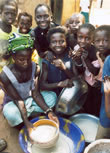 |
| Local community members preparing a breakfast of ground millet. A diet lacking in diversity is a major problem in the Gambia. |
In 2003, the Canadian International Development Agency (CIDA) supported an Exploratory Phase Mission to the Gambia. As a result, partnerships were developed between REAP-Canada, the Njawara Agricultural Training Centre (NATC), Agency Village Support -The Gambia or AVISU (previously known as Village AiD-The Gambia or VATG), and the Gambia National Agricultural Research Institute (NARI). NATC, is a local NGO established by the community for the purpose of training both male and female farmers in sustainable agro-forestry techniques. AVISU is working with women to overcome economic and social barriers to securing livelihood and basic rights. NARI is the Gambia's principal agricultural research and development institute focusing on the advancement of livestock, horticulture, agronomy, and agro-forestry systems. The three organizations have previously collaborated largely on small-scale projects, but are now working together to complement each other's expertise in a larger collaborative effort.
The partners agreed that a holistic and integrated development approach was required to respond to the interrelated challenges of soil infertility, environmental degradation, and lack of income generating opportunities in the Gambia. Introducing diversified ecological farming systems would not only increase the soil's fertility but also enhance crop production, suppress weed growth, inhibit pests and diseases, increase food security, generate more income, reduce use of chemical inputs and improve the health and nutrition of farmers and their families. Between the partners, two CIDA-sponsored development projects were implemented successfully in various regions of the country.
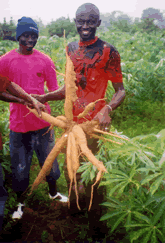 |
| A Gambian farmer pleased with his improved Cassava plant variety. Through learning farms, Gambian farmers are testing and distributing improved plant materials adapted to ecological farming. |
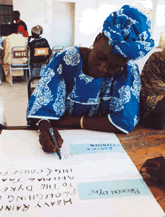 |
| Female farmer discusses water problems in the village and develops solutions with other residents |
The Gambia Ecological Agriculture Development (GEAD) Project
The GEAD project was developed to assist 2 communities in the North Bank Division in the Gambia. Phase 1 of the GEAD Project, initiated in February 2004, involved the introduction of the Agro-Ecological Village Development model by the Njawara Agricultural Training Centre (NATC) as a new approach for sustainable community development as a means to reduce poverty, enhance food security, increase self-reliance and reduce environmental degradation in some of the most impoverished areas of the Gambia. In collaboration with the Gambia's National Agricultural Research Institute (NARI), the project improved the plant material base for ecological farming of community gardens and farms in impoverished areas through a participatory plant material improvement program, and encouraged the development of gender-sensitive agrarian communities through participatory assessment, participatory farmer-to-farmer training and participatory on-farm research approaches.The Gambia Agro-Ecological Village (GAEV) Development Project
The GAEV Project was initiated in August 2004 with REAP-Canada, Njawara Agricultural Training Centre, AVISU, and NARI. The partners implemented the Agro-Ecological Village Development model in three villages to reduce poverty, enhance food security, increase self-reliance and reduce environmental degradation. The project also introduced the Mayon Turbo Stove (MTS) into communities in CRD and North Bank Division (NBD) as a pilot project to help alleviate pressure on deforestation from fuelwood gathering.
The Gaining Ground in Gamiba and Senegal (GGIGS) Project
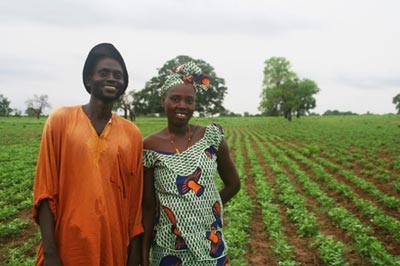 |
| GGIGS Community Organizers on a field visit to learning farm |
During implementation, the GEAD, GAEV and GGIGS projects achieved the following:
- PRA's were conducted in 15 rural communities, the results of which were used during Participatory Action Planning sessions to develop a project work-plan and action plan for ecological agriculture development
- 80 farmer trainers trained on ecological methods (50% women)
- Farmer-to-farmer training networks have been established all over the NB and CRD Regions of the Gambia and within the Peanut Basin of Senegal with over 1000 individuals participating in trainings have been delivered with an average of 50% female participation
- 81 learning farms/gardens successfully established, applying the methods introduced in farmer training in different soil conditions and on a diversity of improved field crops and vegetables, including maize, millet, sweet potato, cassava, rice, groundnut, cowpea and fodders. Adaptation success for these crops was also assessed.
- "Hungry season" learning gardens established to test dry season vegetables and fruits such as such as eggplant, sweet pepper, hot pepper, okra, tomato, cowpea, pigeon pea, Jordan black bean, sweet corn, eggplant lettuce, cabbage, bitter tomato and onion.
- Learning farms were also established to demonstrate agro-forestry species, legume-grass mixtures and fodder grasses such as Gliricidia, Cassia samia and several other warm season grasses
200 farmers were able to access the improved vegetable and crop materials for the learning farms - Over 1200 trees planted as field borders
- 80 farm plans created after trainings on soil quality improvements, crop yields and food security management
- Over 300 improved household cookstoves (the Mayon Turbo Stove and the Rocket Stove) produced and distributed in project and surrounding communities.
The ecological training programs of these projects included the following core trainings: principles of ecology and sustainable agriculture, soil fertility and organic components of soils, composting / Bokashi organics soil amendment, manure management, cropping systems, green manures and cover crops, disease, pest and weed management, soil and water conservation, livestock management, agro-forestry and nursery management, horticulture and dry season vegetable production, cassava and sweet potato production, food processing, preservation, storage and marketing, hungry season food security, leadership and group (CBO) management, gender, plant improvement (adaptability, farmer-led breeding), seed conservation, plant material propagation and multiplication, sesame production & orchard development and the reflect literacy method
Local farmers and trainers were quite active in visiting the learning farms and sharing their experiences through the farmer training network and farmers associations. Some innovations were very quickly adopted on a wide-scale including the spread of improved rice varieties, and composting bio-residues in the fields to increase soil fertility and reduce weed infestation. Farmer Associations established and trained on group management, leadership, constitutional development, record keeping, communication, resource management, and PM&E activities
Increased understanding of ecological methods among farmers already became evident through these project efforts in the Gambia and Senegal. Communication among farmer trainers and community farmers is continuing to develop greater interest in ecological agriculture practices and the AEV approach and farmers confidence in ecological agriculture in the communities has already noticeably increased.
Gambian Mayon Turbo Stove (MTS) Project
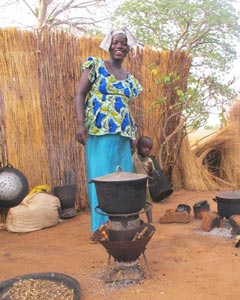 |
| Gambian women cooking dinner on a MTS fueled by rice hulls and groundnut shelles. |
The Gambian MTS Project was initiated in August 2008 with the Tourism Industry Carbon Offset Service (TICOS). It is a three-year initiative that promises to produce 1500 Mayon Turbo Stoves (MTS) for purchase by rural communities throughout the Kombos, North Bank and Central River District Regions of the Gambia. Deforestation is becoming severe in the region, leading to further droughts and unstable weather patterns. A major cause of deforestation is collecting fuel wood for cooking. Indoor air pollution from cooking is also a major source of respiratory illness and disease and shortens the lives of women who must perform this daily task. The MTS is fuelled with agricultural residues such as, rice hulls and peanut shells which are abundantly available in most rural communities, and can reduce particular matter emissions by 67%. IN addition to the savings in cost and time health improvements are also being reported and monitored as the Mayan stoves can be used in the open air and are virtually smoke free.
To learn more about our programming in the Gambia, refer to the documents in our on-line library.




